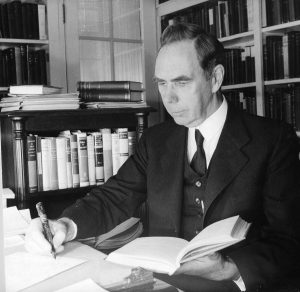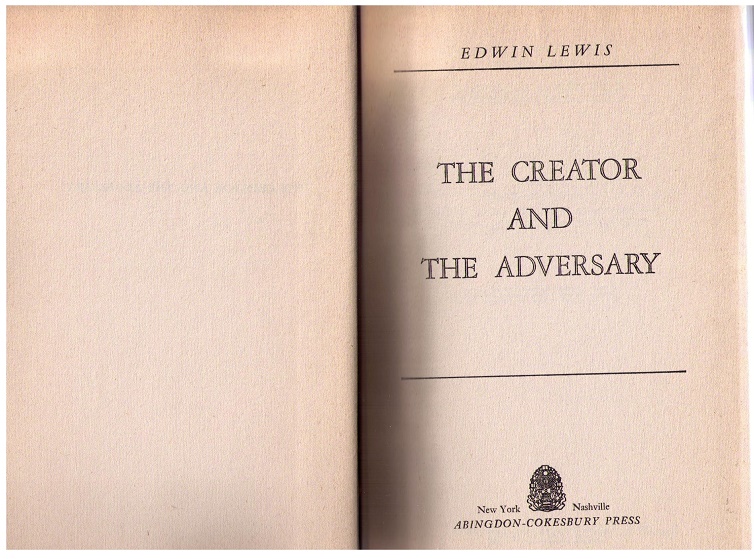What follows is praise for Edwin Lewis (1881–1959), a professor of systematic theology at Drew Theological School and perhaps the most important theologian in the Methodist Church in America in the early to mid-twentieth century. I deal briefly with only one of his works, The Creator and the Adversary (New York/Nashville: Abingdon-Cokesbury Press, 1948), which Lewis considered to be the fruit of his most mature theological labor.

Beginning with human experience
This book seeks to interpret the meaning of human existence and of the world in light of what Lewis calls the “facts” of the presence of evil and of moral conflict within human beings. Exploring these realities leads him to examine the meaning of the power of freedom within human beings as “the key to the mystery of human creaturehood.”
There are competing interpretations of these facts of human existence. Humanists seek to explain them naturalistically without any reference to transcendent reality. Lewis argues that the humanist explanation fails “at the very point where the really important questions begin,” and it does not enable human beings to understand the mystery of their own being.
Lewis contends that as a human being asks “questions of himself about himself,” and then discovers that he cannot answer them, this is “the possible beginning of faith.” He appeals to his reader to recognize “a power resident in the intelligence which elsewhere meets the bafflement.” This power is “the power to believe, the capacity to faith,” logic and faith “being alike intrinsic to one and the same intelligence.“
Divine revelation
All that Lewis had written hithertofore was an exercise in natural theology in order to lay the foundation for a theology of revelation. The mystery of human freedom in a cosmos that is a web of necessity, and the way this freedom results in a discovery of good and evil, cannot be adequately explained except in light of divine revelation. Nor can a human being experience power to do good over evil except through faith.
When Lewis speaks of revelation, he means that “the Creator speaks for himself.” There is general revelation in God’s creation, but the more definitive revelation of God is the special revelation to Israel which comes to a climax with Jesus Christ. God’s nature and purposes are disclosed “in an Act supremely sacrificial–the self-emptying, the humiliation, the obedience event to the point of death by a cross of the very Son of God.”
In the event of divine revelation in Christ, we know that God is “no Solitary,” but “a Personal Fellowship of Holy Love and the constituents of this Fellowship are described as Father, Son, and Holy Spirit.” In the incarnation of Jesus Christ, Lewis further denotes, “God the Father in the person of God the Son through the instrumentality of God the Holy Spirit, receives to himself the worst that evil can do, because only so can he inflict upon evil his most deadly blow.”
The reality of evil
“There was evil before there was sin,” writes Lewis. Evil is manifest from the beginning of the creation. As God is “creativity,” evil is “discreativity”–an “alien power which lays a burden of suffering both upon the Creator himself and upon that which he creates;” a “persistent, immanent, and unpredictable principle of destruction, whether it manifest itself in the framework of existence, or in the order of nature, or in the realm of organisms, or in the hearts and wills of men, or in the intricacies of their social relationships.” Lewis prefers to describe evil as “the Adversary.”
Lewis proposes a theologoumenon–a personal theological opinion, or what he admits is “speculation”–that God and the Adversary are both eternal. It is only when God creates that a conflict occurs between them. He also speculates that there is a “residual” that is eternal; this “residual” is the “common base” from which all things are made; it is equivalent to the “potentiality” of Aristotle or the “non-being” or “receptacle” of Plato.
In my judgment, Lewis has made a wrong move here, a move apparently influenced by Aristotle’s cosmology of an eternal universe. I do think Lewis’ main concern is to express the reality that, whenever God creates, the creation is always threatened by the evil that Karl Barth calls “nothingness” or “chaos” in Church Dogmatics, III. 3 (Edinburgh: T. &T. Clark, 1960). This is why Lewis’ real concern and emphasis are that the appearance of the creation “in the beginning” becomes a stage for conflict between God and the Adversary. However, to further posit, as Lewis does, that the Adversary and also a “residue” are as eternal as God is a mistake, I think. God is pure Being, and at least conceptually it is necessary to think of God creating ex nihilo, out of nothing. The concept of an eternal “residue” is a pre-Christian notion of eternal matter independent of a divine demiurge.
How should we think of the Adversary? Should the Adversary be conceived as an “it” or as “he?” Lewis leaves the question open, observing that “he” says too much and “it” says too little. Nonetheless,” ‘he’ has the merit of preserving the dramatic quality of the creative strife and preventing the all too common reduction of it to the blind action of impersonal law,” for the drama of conflict between God and the Adversary is “a real conflict between real foes on a real stage for real stakes.” Hence Lewis has no objection to speaking of “the devil” and of “hell.”
God’s conflict with the Adversary
The challenge of addressing the origin of evil will always persist, but our attention should be given to the conflict between God and the Adversary. Lewis says, “It is not to be denied that by his very act of creation, God gives the Adversary his opportunity, and that evil and sin become an inevitable concomitant of the creative act. It is not to be denied that God permits evil to run its course, since he can halt it only by halting everything else, and this is to admit final defeat. It is not to be denied that God makes use of evil in many a subtle way to further his own purpose of good, not doing evil that good might come, but enduring evil that good might come. It is not to be denied that evil may contribute to his glory in the very victory he accomplishes through it and gains over it.”
In this arena of “mortal conflict,” God personally participates in order to win the victory over the Adversary, and the assurance of God’s victory is the incarnation of the Son of God as Jesus Christ. The old metaphor of the church fathers [such as Gregory of Nyssa] that the flesh of the Son of God was bait for the devil, who swallowed it and discovered that he had greedily gobbled a great hook, should not be mocked as modern theologians do. Lewis says, “The hook-and-bait metaphor was a way of saying that when the Son of God, ‘the Word became flesh,’ entered the realm of the Adversary, came under the Adversary’s power, and received the blow of the Adversary’s last weapon, which is death, and was securely bound in the tomb behind the great stone which effectively barred the door–that when that happened it was not the Son of God who suffered defeat, but the Adversary.”
Lewis adds that “not evil had conquered at the cross, but love; not death held the key to life, but life held the key to death. Descent was ascent. In love’s stooping was love’s victory. The Adversary provided the means of his own defeat. The ultimate power of frustration meets its own frustration. In the revelation that death, which is the Adversary’s last weapon, is not final, is given the revelation that there is in existence a greater power than discreative evil–the power of creative love.”
Lewis argues that his presentation of the meaning of the drama of the creation and redemption is faithful to the witness of the scriptures. In particular, he presents an entire chapter on the theological message of the Gospel according to St. John, whose world view is centered on the struggle between light and darkness that has been overcome in principle by the incarnate Word, Jesus Christ.
The final divine revelation in Jesus Christ not only gives us “the truth of God,” but also “the truth of man,” for Christ is the fulfillment of “the divine-human mutuality.”
Conclusion
Edwin Lewis’ The Creator and the Adversary is out of print. When writing this essay I noticed that my copy had once been in a library. I opened the book and found that it was stamped “Extension Library/ EX 1057/ Library Candler School of Theology Emory University, Ga.” On the opposite page it was stamped “Withdrawn from Theology Library.”
They should have left it on the shelf.





Comment by Daniel on September 15, 2020 at 9:24 am
It is always refreshing to read these pieces by bishop Whitaker. They are both thought provoking and thoroughly orthodox, in a Methodist way. I hope he keeps writing them and you keep posting them.
Comment by Roger on September 15, 2020 at 5:05 pm
In the beginning God created mankind to be a partner with him who would love him back. Thus God created mankind for a Sacred Romance. [The Fall of Adam and Eve mustn’t be pictured as a crime like theft, but as a betrayal of love. In love, God creates us for love and we give him the back of our hand. Power can do every thing but the most important thing: it cannot control love.] Satan was a created being, but he wants to take God’s place. Satan says to Eve, does God have a good heart? Adam was the first, and Christ is the last Adam. Eve was a helpmeet to Adam. The Bride of Christ is to love the Bridegroom as Eve would have loved Adam had they not fell. Satan tries to steal as many hearts away from Christ as he can. The Resurrection defeated Satan because Christ took away the keys of death from Satan. The dowry that Christ paid for his Bride was his blood on the cross, a very high price. Because of this Grace, our redeemption by believing the Gospel , we too shall be resurrected with Christ one day.
Note: quote [ ] from the book, The Sacred Romance, by Brent Curtis & John Eldridge was used.
Comment by Dave Holt on October 8, 2022 at 3:32 am
I just finished reading God and Ourselves, a well-written and insightful book. I have not read the one you mention here but now that I’m familiar with his work I am tempted to explore more of it. Thank you.